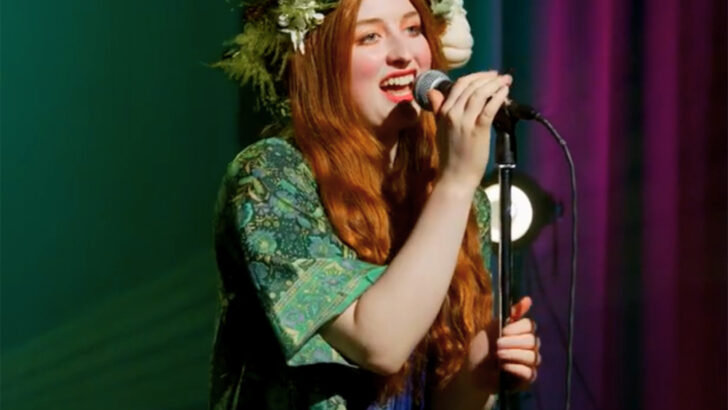I always love hearing about green shoots when it comes to religion, and especially in relation to young people.
On The Hard Shoulder (Newstalk, Wednesday) there was a discussion on the matter with Wendy Grace of Spirit Radio and singer-songwriter Ciara Lawless. This was on foot or a survey from the UK that showed Gen Z likely to be the more spiritual generation – these are people born in the late 90’s and early 2000’s. Presenter Kieran Cuddihy raised an issue at the start about the difference between religion and spirituality and then parked it, which created a problem as there weren’t clear definitions and some of the discussion was at cross purposes.
Ciara Lawless was brought up Catholic and was deeply interested in religion since the age of 6 when she regarded the saving of her life after an accident as a miracle – her grandad prayed for strength and then lifted a heavy gate off her single-handedly. From her early twenties she seemed to get more into a vague spirituality – she described spirituality as ‘whatever it wants to be to anybody’. She had an emphasis on mindfulness and self-acceptance, still with a belief in God but embracing concepts like ‘higher power’ or ‘source’. Whatever the case, she felt she was being guided and looked after. She found younger people more interested in this approach which, she said, was more individual in nature.
By contrast Wendy Grace saw the downside of “rampant individualism” and seemed to pursue a more orthodox Catholic route – she had come back to the faith of her childhood in college, drawn initially by an intellectual approach – e.g. reading the work of religious scientists. She finds that modern people of Faith propose Faith rather than imposing it. She also reckons that the renewed interest in spirituality is due to a hollowness in modern life – where people were never more connected (digitally I presume) but were still lonely. Now there was a search for authenticity, while being Christian now was rebellious and counter-cultural. She referenced World Youth Days, with millions of young people gathering, but no trouble or anti-social behaviour.
Much was made of the desire and search for happiness – fair enough, but wouldn’t goodness and doing the right thing be more important? Maybe you can only be happy if you’re good and do the right thing.
Religion and society featured in President Donald Trump’s address to the National Capitol Prayer Breakfast (Sky News, Thursday). Though there was the usual rambling and hyperbole, he was more measured and reflective than usual (low bar!). He called for greater unity in the USA, though often he creates disunity. He reckoned Democrats and Republicans can now, as they could in the past, sit down to dinner together. He understood how Covid lockdowns had a bad effect on religious practice, but stressed he wasn’t blaming anyone (definitely a first!). He said we need more God and religion in our lives. He realised, he said, how difficult it could be to achieve compromise on controversial matters and spoke of meeting someone who had strongly disagreed with the ban he signed the previous day preventing transgender athletes from performing in woman’s sports. How do you get compromise there, he wondered? They either were allowed, or they weren’t.
Trump has been dominating news and current affairs since inauguration, especially with a flurry of executive orders. It was described as a “whirlwind” on Sunday Sequence (BBC Radio Ulster) when the implications of Trump’s presidency for what presenter Audrey Carville referred to as “rules-based democracy centred on human rights”. It was a spirited discussion with a variety of viewpoints, though it was largely a case of two to one against Trump’s approaches. Former Irish ambassador Bobby McDonagh referenced gospel values like a spirit of decency, morality and good human values and obviously found these lacking in Trump’s actions, while journalist Karl Dieter was more positive towards Trump, wanting us to take the “oral diarrhoea” with a grain of salt and focus on what actually got done. He saw Trump’s plans for Gaza being in the tradition of the US building up countries like Germany and Japan after previous wars. Human rights lawyer Caoilfhionn Gallagher was mostly critical, fearing Trump’s actions could embolden autocratic regimes, but she did admire the work of the first Trump administration, continued under Biden, in getting US hostages released around the world.
She believed European countries could learn from this.
JUBILEE AUDIENCE WITH POPE FRANCIS
EWTN Saturday February 15, 8am
Live from St Peter’s Square, the Jubilee Audience of Pope Francis.
JUST MERCY
BBC One Saturday February 15, 11.53pm
In 1988, attorney Bryan Stevenson courageously chooses to fight injustice, armed with nothing but a Harvard law degree and the resolve to help people whose lives are literally on the line.
SUNDAY SEQUENCE
BBC Radio Ulster Sunday February 16, 8.30am
Topical religious affairs with a Northern Ireland flavour.


 Brendan O’Regan
Brendan O’Regan Irish singer-songwriter Ciara Lawless.
Irish singer-songwriter Ciara Lawless. 